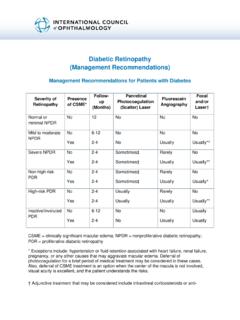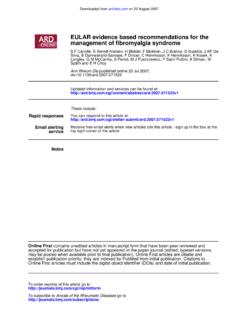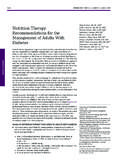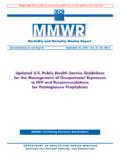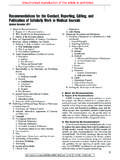Transcription of Diagnosis and Management of Prostate Cancer in …
1 Diagnosis and Management of Prostate Cancer in New Zealand Men recommendations from the Prostate Cancer Taskforce Citation: Prostate Cancer Taskforce. 2012. Diagnosis and Management of Prostate Cancer in New Zealand Men: recommendations from the Prostate Cancer Taskforce. Wellington: Ministry of Health. Published in May 2013 by the Ministry of Health PO Box 5013, Wellington 6145, New Zealand ISBN 978-0-478-40264-3 (online). HP 5647. This document is available at iii Contents Executive summary .. v vi 1 Introduction .. 1. Prostate Cancer Quality Improvement Programme.
2 3. Role of the Prostate Cancer Taskforce .. 3. Achieving 3. Project governance and reporting .. 3. Taskforce membership .. 4. Process .. 4. 2 Equity .. 5. Health services .. 6. Impact .. 8. 3 Public 10. Prostate 10. Prevention of Prostate Cancer .. 11. Relatives with Prostate Cancer .. 12. Prostate Cancer in M ori and Pacific men .. 12. Diagnosis of Prostate Cancer .. 13. Management of Prostate Cancer .. 15. Presentation of information .. 15. 4 Prostate Cancer in primary care .. 16. Clinical presentations to general practice.
3 16. Use and interpretation of the serum PSA test .. 19. Use and interpretation of the digital rectal examination .. 20. Management of the screening and diagnostic pathway in a general practice .. 20. When to refer .. 20. Network 21. Active surveillance .. 21. Follow-up after successful care for Prostate 22. Palliative care .. 22. The role of advanced practice nurses .. 22. Diagnosis and Management of Prostate Cancer in New Zealand Men iv 5 Diagnostic guidelines .. 25. PSA modifications .. 25. The decision to proceed with Prostate biopsy.
4 27. Biopsy 27. 6 Pathology reporting of Prostate Cancer 29. 7 Active surveillance .. 32. Eligibility .. 34. Clinical monitoring methods .. 35. Indications for 35. 8 Watchful waiting .. 37. 9 Curative treatments .. 38. Active surveillance .. 41. Radical prostatectomy .. 41. Radiation therapy .. 43. Quality of life of patients with localised Prostate Cancer .. 47. 10 Metastatic Prostate Cancer .. 50. 11 Access to health services .. 52. Appendix: Prostate Cancer Taskforce membership .. 53. Glossary of terms and abbreviations .. 55.
5 List of tables Table 1: Clinical trials of active surveillance for organ-confined Prostate Cancer : inclusion criteria, EAU guidelines 2012 .. 33. Table 2: Investigation of metastatic disease .. 38. Table 3: Risk of recurrence groups and treatment options .. 40. Diagnosis and Management of Prostate Cancer in New Zealand Men v Executive summary Prostate Cancer is a significant burden to men's health. It is now one of the most important problems facing New Zealand men. Prostate Cancer has a slow rate of growth and most tumours remain organ confined for longer than other malignancies.
6 Because of these features, clinicians have been working to find a reliable way of detecting it early so that potentially life-saving treatments can be implemented promptly. To date, Prostate specific antigen (PSA) testing has provided a relatively simple means of population screening for Prostate Cancer . Unfortunately, however, PSA does not diagnose Prostate Cancer with certainty and not all men with Prostate Cancer will have high PSA. levels. In addition, where Prostate Cancer is detected early, clinically indolent cancers may be overdiagnosed resulting in overtreatment, although this consequence is reducing as active surveillance is increasingly being adopted as a first-line Management strategy.
7 These conundrums have led to the current disagreement among clinicians and public health workers regarding which patients should be offered screening for Prostate Cancer . Furthermore, there is now a great deal of confusion among men, their families and wh nau and their general practitioners as to the value of PSA testing and the benefit or otherwise of treating newly diagnosed Prostate Cancer . In light of the issues surrounding screening for Prostate Cancer and the benefits or otherwise of early Diagnosis , the Health Committee conducted an inquiry into the early detection and Management of Prostate Cancer in New Zealand.
8 The Health Committee considered that before organised national screening could be advocated in New Zealand, there would have to be clear evidence that the benefits of screening outweigh the harms. Currently this has not been established. While not recommending a national Prostate screening programme on current evidence, the Health Committee did recommend establishing an equity-focused Quality Improvement Programme. This programme would ensure that men receive evidence-based information about Prostate Cancer testing and treatment, which they could use to make informed decisions, and that they have timely access to high-quality care along the entire treatment pathway.
9 It was therefore determined that the Ministry of Health would develop a framework for the Quality Improvement Programme, as recommended by the Health Committee, within existing resources. The Prostate Cancer Taskforce (the Taskforce) has developed the clinical content and key recommendations to inform the Quality Improvement Programme. The Ministry of Health will produce a costed Quality Improvement Programme based on the Taskforce's information and recommendations . After considering all components of the clinical pathway, the Taskforce has developed its list of recommendations .
10 At the start of the pathway it recommends providing men and their families and wh nau with information about the Prostate , Prostate Cancer and symptoms through the public domain. This information must be relevant, unambiguous and culturally appropriate. Next the Taskforce emphasises the central role of the general practitioner in screening and assessing men for Prostate Cancer . General practitioners and their practices must support men who are entering a Prostate Cancer pathway of care after the initial Diagnosis and through subsequent treatment.



